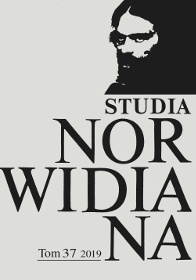„Orzeł? Nie jest pół-żółwiem, pół-gromem”. Problem ironii romantycznej w Vade-mecum
“Eagle? It is not half-turtle, half-thunder”. The problem of romantic irony in Vade-mecum
Author(s): Gerard RongeSubject(s): Language and Literature Studies, Studies of Literature, Polish Literature
Published by: Towarzystwo Naukowe KUL & Katolicki Uniwersytet Lubelski Jana Pawła II
Keywords: Cyprian Norwid; Søren Kierkegaard; Romantic irony; Vade-mecum; permanent parabasis
Summary/Abstract: Numerous studies on the works composing the volume Vade-mecum confirm that although the individual poems are characterised by great ethical sensitivity and strong moral rigour, it is difficult to clearly define the worldview of Norwid’s work. The author of the article proposes an interpretation of Vade-mecum, taking into account the problem of Romantic irony. The poet uses irony as a tool to reach the elusive Truth. For him, ironic distance is not distancing himself from the views professed in particular works, but an awareness of the imperfections of a language which may falsify those views. Irony helps him in his quest to “give the right word to the thing”, not allowing the language to simplify or reduce the moral statements expressed in individual works.
Journal: Studia Norwidiana
- Issue Year: 2019
- Issue No: 37
- Page Range: 131-143
- Page Count: 13
- Language: Polish

